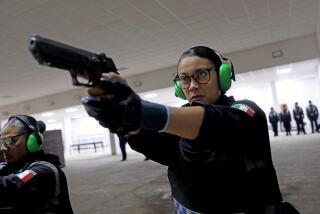Bush Cites Gulf Victory in Call to Battle Crime : Law Enforcement: President says a soldier may have been safer at Kuwaiti front than in his own hometown.
- Share via
WASHINGTON — President Bush, saying that a U.S. soldier may have been safer in the Persian Gulf conflict than on the streets of his own hometown, urged law enforcement officials Tuesday to “take back the streets and liberate our neighborhoods from the tyranny of fear.”
Attempting to apply the momentum of the Gulf victory to winning passage of a tough crime bill from Congress, Bush said: “The kind of moral force and national will that freed Kuwait city from abuse can free America’s cities from crime.”
Bush’s call for a crackdown--a call interrupted frequently by sharp applause from an audience of several hundred police, prosecutors, prison authorities and judges from around the nation--was similar to the anti-crime rhetoric and goals set by the Ronald Reagan Administration 10 years ago.
But W. Lee Rawls, assistant attorney general for legislative affairs, said the Administration expects the Gulf victory to give a “major boost” to its efforts to expand the death penalty, limit appeals by criminal defendants and broaden rules on admission of evidence seized illegally by police acting in good faith.
Last October, in the final hours of the last Congress, a House-Senate conference committee stripped from an omnibus crime bill its most controversial sections. These Administration-backed proposals included extending the federal death penalty to about 30 additional crimes, cutting back the right of habeas corpus appeals to federal courts and softening the rule barring illegally seized evidence from criminal trials.
The final bill, which Bush signed, stiffened penalties for white-collar criminals, improved victims’ rights laws, imposed controls on steroids and on a dangerous drug known as “ice,” doubled the number of FBI agents assigned to fight drugs, added 1,000 new drug agents and doubled federal aid to local law enforcement.
In his speech Tuesday, Bush made clear that the Administration will step up its call for enactment of the measures that were dropped from the bill.
“We’re not giving up on this crime bill,” Bush said. “We’re not going to let it get watered down. And we’re not going to put our crime fighters in harm’s way without backing them to the hilt.”
At the same time, Bush made just as clear that the Administration will continue to oppose a ban on the domestic manufacture of assault weapons--also dropped from last year’s bill--and other steps advocated by gun control advocates, such as a waiting period before purchase of a handgun.
Instead, Bush noted that the Administration favors ratcheting up penalties for those who use deadly weapons in the commission of a crime.
“We need a crime bill that will stop the endless, frivolous appeals that clog our habeas corpus system, one that guarantees that criminals who use serious weapons face serious time and one that ensures that evidence gathered by good cops acting in good faith isn’t barred by technicalities that let bad people go free,” Bush told the cheering law enforcers.
“And for the most heinous of crimes, we need a workable death penalty, which is to say, a real death penalty.”
In an earlier draft of the speech Bush delivered, his reference to a soldier facing more danger at home than in the Persian Gulf was specifically tied to the District of Columbia, where the murder rate has been soaring.
In the final version, however, Bush simply referred to a news report that “during the first three days of the ground offensive, more Americans were killed in some American cities than at the entire Kuwaiti front.
“Think of it, one of our brave National Guardsmen may have actually been safer in the midst of the largest armored offensive in history than he would have been on the streets of his own hometown. It’s outrageous, it’s wrong and it’s going to change.”
Bush’s attempt to turn the Gulf victory into support for controversial domestic measures drew immediate fire from some Democrats.
Rep. Charles E. Schumer (D-N.Y.), new chairman of the House Judiciary subcommittee on crime and criminal justice, for instance, said Bush’s call for action “is unfortunately not accompanied by the tough policies needed to achieve this goal.”
Although welcoming the President’s proposal to double the mandatory minimum prison sentences for gun offenses, Schumer said it falls “far short of what needs to be done.”
Schumer said that “much of the answer” is in the Administration-opposed “Brady bill,” which provides for a waiting period of up to seven days before a handgun can be purchased.
Bush cited Los Angeles Police Chief Daryl F. Gates as one of “the All-American heroes” in his audience, recalling that he stood with Gates last May in Oakwood, a section of Venice, “looking out over a neighborhood where they reclaimed their streets, their kids, their future.”
On that visit, Bush commended Foster Webster, a 72-year-old semi-retired janitor who led a months-long crusade to clean up the drug- and gang-plagued Oakwood neighborhood.
Through combined efforts of the police and the community, Oakwood in the nine months before Bush’s visit experienced a decline of more than 40% in overall crime, including gang- and drug-related activities. Earlier, residents had reported that drug dealing by day and gang shootings at night had made their neighborhood dangerous territory.
More to Read
Sign up for Essential California
The most important California stories and recommendations in your inbox every morning.
You may occasionally receive promotional content from the Los Angeles Times.













